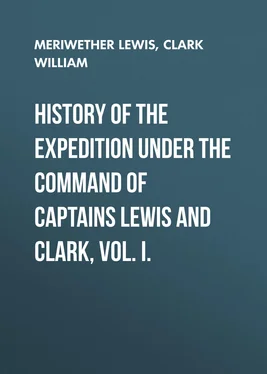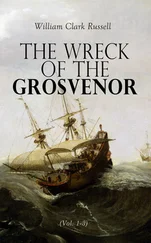William Clark - History of the Expedition under the Command of Captains Lewis and Clark, Vol. I.
Здесь есть возможность читать онлайн «William Clark - History of the Expedition under the Command of Captains Lewis and Clark, Vol. I.» — ознакомительный отрывок электронной книги совершенно бесплатно, а после прочтения отрывка купить полную версию. В некоторых случаях можно слушать аудио, скачать через торрент в формате fb2 и присутствует краткое содержание. Жанр: Путешествия и география, История, foreign_edu, foreign_antique, foreign_prose, на английском языке. Описание произведения, (предисловие) а так же отзывы посетителей доступны на портале библиотеки ЛибКат.
- Название:History of the Expedition under the Command of Captains Lewis and Clark, Vol. I.
- Автор:
- Жанр:
- Год:неизвестен
- ISBN:нет данных
- Рейтинг книги:5 / 5. Голосов: 1
-
Избранное:Добавить в избранное
- Отзывы:
-
Ваша оценка:
- 100
- 1
- 2
- 3
- 4
- 5
History of the Expedition under the Command of Captains Lewis and Clark, Vol. I.: краткое содержание, описание и аннотация
Предлагаем к чтению аннотацию, описание, краткое содержание или предисловие (зависит от того, что написал сам автор книги «History of the Expedition under the Command of Captains Lewis and Clark, Vol. I.»). Если вы не нашли необходимую информацию о книге — напишите в комментариях, мы постараемся отыскать её.
History of the Expedition under the Command of Captains Lewis and Clark, Vol. I. — читать онлайн ознакомительный отрывок
Ниже представлен текст книги, разбитый по страницам. Система сохранения места последней прочитанной страницы, позволяет с удобством читать онлайн бесплатно книгу «History of the Expedition under the Command of Captains Lewis and Clark, Vol. I.», без необходимости каждый раз заново искать на чём Вы остановились. Поставьте закладку, и сможете в любой момент перейти на страницу, на которой закончили чтение.
Интервал:
Закладка:
August 27. The morning star appeared much larger than usual. A gentle breeze from the southeast carried us by some large sandbars, on both sides and in the middle of the river, to a bluff, on the south side, at seven and a half miles distant; this bluff is of white clay or chalk, under which is much stone, like lime, incrusted with a clear substance, supposed to be cobalt, and some dark ore. Above this bluff we set the prairie on fire, to invite the Sioux. After twelve and a half miles, we had passed several other sandbars, and now reached the mouth of a river called by the French Jacques (James river) or Yankton, from the tribe which inhabits its banks. It is about ninety yards wide at the confluence: the country which it waters is rich prairie, with little timber: it becomes deeper and wider above its mouth, and may be navigated a great distance; as its sources rise near those of St. Peter's, of the Mississippi, and the red river of lake Winnipeg. As we came to the mouth of the river, an Indian swam to the boat; and, on our landing, we were met by two others, who informed us that a large body of Sioux were encamped near us: they accompanied three of our men, with an invitation to meet us at a spot above the river: the third Indian remained with us: he is a Maha boy, and says that his nation have gone to the Pawnees to make peace with them. At fourteen miles, we encamped on a sandbar to the north. The air was cool, the evening pleasant, the wind from the southeast, and light. The river has fallen gradually, and is now low.
Tuesday, 28th. We passed, with a stiff breeze from the south, several sandbars. On the south is a prairie which rises gradually from the water to the height of a bluff, which is, at four miles distance, of a whitish colour, and about seventy or eighty feet high. Further on is another bluff, of a brownish colour, on the north side; and at the distance of eight and a half miles is the beginning of Calumet bluff, on the south side, under which we formed our camp, in a beautiful plain, to wait the arrival of the Sioux. At the first bluff the young Indian left us and joined their camp. Before reaching Calumet bluff one of the periogues ran upon a log in the river, and was rendered unfit for service; so that all our loading was put into the second periogue. On both sides of the river are fine prairies, with cotton wood; and near the bluff there is more timber in the points and valleys than we have been accustomed to see.
Wednesday, 29th. We had a violent storm of wind and rain last evening; and were engaged during the day in repairing the periogue, and other necessary occupations; when, at four o'clock in the afternoon, sergeant Pryor and his party arrived on the opposite side, attended by five chiefs, and about seventy men and boys. We sent a boat for them, and they joined us, as did also Mr. Durion, the son of our interpreter, who happened to be trading with the Sioux at this time. He returned with sergeant Pryor to the Indians, with a present of tobacco, corn, and a few kettles; and told them that we would speak to their chiefs in the morning. Sergeant Pryor reported, that on reaching their village, which is at twelve miles distance from our camp, he was met by a party with a buffaloe robe, on which they desired to carry their visitors: an honour which they declined, informing the Indians that they were not the commanders of the boats: as a great mark of respect, they were then presented with a fat dog, already cooked, of which they partook heartily, and found it well flavoured. The camps of the Sioux are of a conical form, covered with buffaloe robes, painted with various figures and colours, with an aperture in the top for the smoke to pass through. The lodges contain from ten to fifteen persons, and the interior arrangement is compact and handsome, each lodge having a place for cooking detached from it.
August 30th. Thursday. The fog was so thick that we could not see the Indian camp on the opposite side, but it cleared off about eight o'clock. We prepared a speech, and some presents, and then sent for the chiefs and warriors, whom we received, at twelve o'clock, under a large oak tree, near to which the flag of the United States was flying. Captain Lewis delivered a speech, with the usual advice and counsel for their future conduct. We then acknowledged their chiefs, by giving to the grand chief a flag, a medal, a certificate, with a string of wampum; to which we added a chief's coat; that is, a richly laced uniform of the United States artillery corps, and a cocked hat and red feather. One second chief and three inferior ones were made or recognised by medals, and a suitable present of tobacco, and articles of clothing. We then smoked the pipe of peace, and the chiefs retired to a bower, formed of bushes, by their young men, where they divided among each other the presents, and smoked and eat, and held a council on the answer which they were to make us to-morrow. The young people exercised their bows and arrows in shooting at marks for beads, which we distributed to the best marksmen; and in the evening the whole party danced until a late hour, and in the course of their amusement we threw among them some knives, tobacco, bells, tape, and binding, with which they were much pleased. Their musical instruments were the drum, and a sort of little bag made of buffaloe hide, dressed white, with small shot or pebbles in it, and a bunch of hair tied to it. This produces a sort of rattling music, with which the party was annoyed by four musicians during the council this morning.
August 31. In the morning, after breakfast, the chiefs met, and sat down in a row, with pipes of peace, highly ornamented, and all pointed towards the seats intended for captains Lewis and Clarke. When they arrived and were seated, the grand chief, whose Indian name, Weucha, is, in English Shake Hand, and, in French, is called Le Liberateur (the deliverer) rose, and spoke at some length, approving what we had said, and promising to follow our advice:
"I see before me," said he, "my great father's two sons. You see me, and the rest of our chiefs and warriors. We are very poor; we have neither powder nor ball, nor knives; and our women and children at the village have no clothes. I wish that as my brothers have given me a flag and a medal, they would give something to those poor people, or let them stop and trade with the first boat which comes up the river. I will bring chiefs of the Pawnees and Mahas together, and make peace between them; but it is better that I should do it than my great father's sons, for they will listen to me more readily. I will also take some chiefs to your country in the spring; but before that time I cannot leave home. I went formerly to the English, and they gave me a medal and some clothes: when I went to the Spanish they gave me a medal, but nothing to keep it from my skin; but now you give me a medal and clothes. But still we are poor; and I wish, brothers, you would give us something for our squaws."
"When he sat down, Mahtoree, or White Crane, rose:
"I have listened," said he, "to what our father's words were yesterday; and I am, to-day, glad to see how you have dressed our old chief. I am a young man, and do not wish to take much: my fathers have made me a chief: I had much sense before, but now I think I have more than ever. What the old chief has declared I will confirm, and do whatever he and you please: but I wish that you would take pity on us, for we are very poor."
Another chief, called Pawnawneahpahbe, then said;
"I am a young man, and know but little: I cannot speak well; but I have listened to what you have told the old chief, and will do whatever you agree."
The same sentiments were then repeated by Aweawechache.
We were surprised at finding that the first of these titles means "Struck by the Pawnee," and was occasioned by some blow which the chief had received in battle, from one of the Pawnee tribe. The second is, in English, "Half Man," which seems a singular name for a warrior, till it was explained to have its origin, probably, in the modesty of the chief; who, on being told of his exploits, would say, "I am no warrior: I am only half a man." The other chiefs spoke very little; but after they had finished, one of the warriors delivered a speech, in which he declared he would support them. They promised to make peace with the Ottoes and Missouris, the only nations with whom they are at war. All these harangues concluded by describing the distress of the nation: they begged us to have pity on them: to send them traders: that they wanted powder and ball; and seemed anxious that we should supply them with some of their great father's milk, the name by which they distinguish ardent spirits. We then gave some tobacco to each of the chiefs, and a certificate to two of the warriors who attended the chief. We prevailed on Mr. Durion to remain here, and accompany as many of the Sioux chiefs as he could collect, down to the seat of government. We also gave his son a flag, some clothes, and provisions, with directions to bring about a peace between the surrounding tribe, and to convey some of their chiefs to see the president. In the evening they left us, and encamped on the opposite bank, accompanied by the two Durions. During the evening and night we had much rain, and observed that the river rises a little. The Indians, who have just left us, are the Yanktons, a tribe of the great nation of Sioux. These Yanktons are about two hundred men in number; and inhabit the Jacques, Desmoines, and Sioux rivers. In person they are stout, well proportioned, and have a certain air of dignity and boldness. In their dress they differ nothing from the other bands of the nation whom we saw, and will describe afterwards: they are fond of decorations, and use paint, and porcupine quills, and feathers. Some of them wore a kind of necklace of white bear's claws, three inches long, and closely strung together round their necks. They have only a few fowling pieces, being generally armed with bows and arrows, in which, however, they do not appear as expert as the more northern Indians. What struck us most was an institution, peculiar to them, and to the Kite Indians, further to the westward, from whom it is said to have been copied. It is an association of the most active and brave young men, who are bound to each other by attachment, secured by a vow, never to retreat before any danger, or give way to their enemies. In war they go forward without sheltering themselves behind trees, or aiding their natural valour by any artifice. This punctilious determination, not to be turned from their course, became heroic, or ridiculous, a short time since, when the Yanktons were crossing the Missouri on the ice. A hole lay immediately in their course, which might easily have been avoided, by going round. This the foremost of the band disdained to do; but went straight forward, and was lost. The others would have followed his example, but were forcibly prevented by the rest of the tribe. These young men sit, and encamp, and dance together, distinct from the rest of the nation: they are generally about thirty or thirty-five years old; and such is the deference paid to courage, that their seats in council are superior to those of the chiefs, and their persons more respected. But, as may be supposed, such indiscreet bravery will soon diminish the numbers of those who practise it; so that the band is now reduced to four warriors, who were among our visitors. These were the remains of twenty-two, who composed the society not long ago; but, in a battle with the Kite Indians, of the Black Mountains, eighteen of them were killed, and these four were dragged from the field by their companions.
Читать дальшеИнтервал:
Закладка:
Похожие книги на «History of the Expedition under the Command of Captains Lewis and Clark, Vol. I.»
Представляем Вашему вниманию похожие книги на «History of the Expedition under the Command of Captains Lewis and Clark, Vol. I.» списком для выбора. Мы отобрали схожую по названию и смыслу литературу в надежде предоставить читателям больше вариантов отыскать новые, интересные, ещё непрочитанные произведения.
Обсуждение, отзывы о книге «History of the Expedition under the Command of Captains Lewis and Clark, Vol. I.» и просто собственные мнения читателей. Оставьте ваши комментарии, напишите, что Вы думаете о произведении, его смысле или главных героях. Укажите что конкретно понравилось, а что нет, и почему Вы так считаете.












